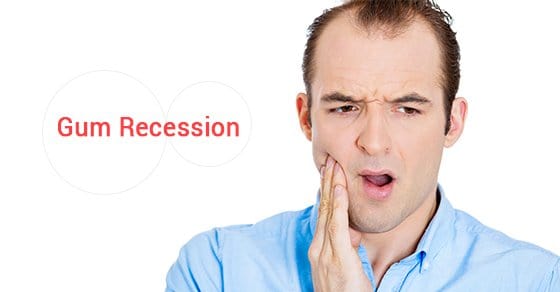Gum recession is when your gum line starts to recede and expose more of the tooth, eventually exposing the root of the tooth. It sounds scary, but if caught early enough, there are many ways you can treat and prevent gum recession at home or with the help of your dentist. The best treatment is prevention, so let’s look at some common causes of gum recession so that you can know what to do and what to avoid!

- Brushing and/or Flossing RoughlyIt’s great to have a good oral hygiene routine, but be careful about being too aggressive with your brushing and flossing. Make sure you choose a toothbrush labeled “soft” and that you don’t floss too often. Flossing once a day is recommended, but more than that can damage the gum tissue and cause recession. Additionally, take care to floss gently.
- Poor Oral HealthOn the other side of the coin, if you are not brushing or flossing enough and have poor oral hygiene, you may be susceptible to gum disease. Gum disease begins as gingivitis: symptoms include inflamed, red, or bleeding gums. Gingivitis is easy to address by continuing with good oral health habits, or perhaps medicated mouthwash as prescribed by your dentist. However, if left untreated, gingivitis can develop into gum disease, which increases your likelihood of gum recession, as well as many other negative oral and overall health consequences.
- Tooth GrindingMany people grind their teeth, often at nighttime, and are unaware of it. If you often have tension around your jaw, or pain, or your partner tells you you grind your teeth, it’s important to see your dentist. Your dentist can fit you with a custom plastic mouthguard that will easily and painlessly help protect your teeth against grinding and may help alleviate grinding symptoms.
There are a few other causes of gum recession, such as genetics or injury or trauma to a tooth. If you believe you are at a heightened risk for gum recession, let your dentist know. They can instruct you on proper oral hygiene habits and keep an eye out for early signs.
The treatment for gum recession depends on the severity of the recession. It’s great if you can catch it early. Your dentist can recommend what to do at home, such as getting a softer toothbrush or flossing less often, in order to stop the recession.
If the gum recession is more advanced, especially if it’s caused by gum disease, you may have to go in for a deep-cleaning procedure called root planing. In very severe cases, a surgical procedure may be needed.